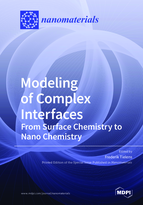Modeling of Complex Interfaces: From Surface Chemistry to Nano Chemistry
A special issue of Symmetry (ISSN 2073-8994).
Deadline for manuscript submissions: closed (31 May 2018)
Special Issue Editor
Interests: density functional theory (DFT); silica-based materials; noble metals; bio- and biological materials; theoretical chemistry; computational chemistry; materials characterization at the atomic/molecular level
Special Issue Information
Dear Colleagues,
For a few years, quantum chemical modeling of materials has experienced a tremendous boost, which is in line with the available computation power. However, Moore’s law being respected or not, the difficulty in modeling has now been shifted to the construction of the model itself. Of course, the accuracy of the calculations can be improved further, but the main chemical properties and their trends are relatively well-reproduced nowadays. One can say that density functional theory (DFT) is now at a mature age and that it can be used as a reliable prediction tool in material science applications. Nevertheless, DFT is especially efficient at describing chemical phenomena at the molecular level, and the systems studied increase continuously in size and complexity. The size of the system is directly related to the computation power, and the complexity is related to the quality of the calculation method and the representation of the chemical environment in the model. It is the latter property that brings the computational chemist’s chemical intuition and general chemistry knowledge the forefront. In this Special Issue, we want to focus on the construction of pertinent models that are able to describe and predict, as accurately as possible, with available computation power, the chemistry of materials.
Prof. Frederik Tielens
Guest Editor
Manuscript Submission Information
Manuscripts should be submitted online at www.mdpi.com by registering and logging in to this website. Once you are registered, click here to go to the submission form. Manuscripts can be submitted until the deadline. All submissions that pass pre-check are peer-reviewed. Accepted papers will be published continuously in the journal (as soon as accepted) and will be listed together on the special issue website. Research articles, review articles as well as short communications are invited. For planned papers, a title and short abstract (about 100 words) can be sent to the Editorial Office for announcement on this website.
Submitted manuscripts should not have been published previously, nor be under consideration for publication elsewhere (except conference proceedings papers). All manuscripts are thoroughly refereed through a single-blind peer-review process. A guide for authors and other relevant information for submission of manuscripts is available on the Instructions for Authors page. Symmetry is an international peer-reviewed open access monthly journal published by MDPI.
Please visit the Instructions for Authors page before submitting a manuscript. The Article Processing Charge (APC) for publication in this open access journal is 2400 CHF (Swiss Francs). Submitted papers should be well formatted and use good English. Authors may use MDPI's English editing service prior to publication or during author revisions.
Keywords
- DFT
- Surface science
- Heterogenous catalysis
- Oxides
- Metals
- Biological minerals
- Adsorption
- Electrochemistry
- Self-assembled monolayers
- Solid/Liquid interface






